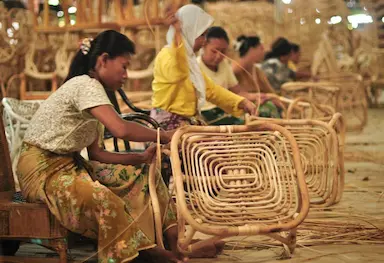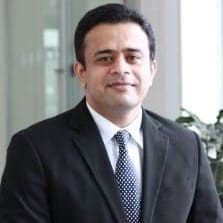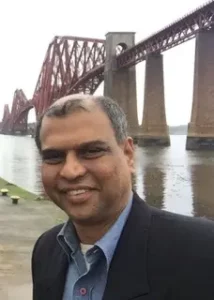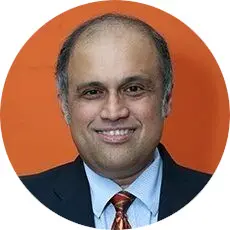
MSMEs are essential to achieving inclusive sustainable growth through innovations, which is the foundation of developing economies. MSMEs are important to communities all over the world since they use the least amount of capital to industrialize rural and underdeveloped areas while giving vulnerable and marginalized individuals a lot of employment opportunities. Through the fair distribution of national resources, MSMEs significantly contribute to the reduction of regional imbalances. MSMEs in developing nations confront a variety of growth and development obstacles, including a lack of financing, insurance, insurance coverage, human resource and technology capabilities, and limited access to electricity and the internet. Due to these difficulties, MSMEs are more susceptible to the effects of climate change and find it difficult to survive extreme weather conditions and climate catastrophes. Even though MSMEs are susceptible to climate change, they may play a significant part in fostering community resilience by embracing innovation in goods and services that offer ways to counteract and adapt to the consequences of climate change.
Green MSMEs use environmentally friendly production methods and/or materials, such as eco-design, green architecture, renewable energy, and energy efficiency. MSMEs have the capacity to not only expand but also pave the way for a more sustainable form of economic growth that supports the green economy through innovation, creativity, and technology. MSMEs are deeply woven within their communities, and they are aware of the regional demand and supply as well as the climatic, environmental, and socioeconomic elements that aid in identifying needs and meeting them. Despite the difficulties, MSMEs have a chance to create inexpensive climate-resilient goods and services for the most vulnerable populations, assisting the community in adjusting to the effects of climate change. For example, by 2030, there will be a $3 trillion economic potential in Africa to invest in finding sustainable solutions to the continent’s climate change. Through programs like the UN Framework Convention on Climate Change’s Green Climate Fund, there is a chance for the growth of green SMEs, particularly in Africa. The fund seeks to generate $100 billion annually for the development of green businesses and supports green development in developing nations. Additionally, the USADF Off-Grid Energy Challenge aims to provide dependable solar energy to African SMEs.
For the most remote, low-income, rural and urban populations who struggle with water contamination from flooding, the Waterlife Company in India uses a special and innovative combination of the greatest green technology and new business models. Paaduks, a SME, collaborates with cobblers to create upcycled, environmentally friendly footwear with soles manufactured from used conveyor belts, rubber matting, and scrap tires. The result is simple, stylish footwear that has a minimal environmental impact. Nuru Energy and the state of Maharashtra, India, have jointly developed an innovative off-grid recharging platform that uses human power to recharge portable LED lights as well as other low-power gadgets like radios and cell phones. In Delhi-NCR, Eco-Wise is a provider of all-inclusive trash management and recycling services that collect, sort, and handle both household and commercial waste. Avani Foundation is a power facility that uses combustible pine needles to produce electricity in Kumao, Uttarakhand. Numerous MSMEs, including RAS, UPS, and others, have adapted the production of bricks derived from toxic fly ash in Bihar, India.
The city of Dakar, the capital of Senegal, is one of the major seaports on the coast of western Africa. Additionally, Dakar and Senegal’s coastline serves as a rubbish dump, and the country has struggled with garbage management for years. The small business owners in the local informal sector sell trash to the nearby areas that lack flood defenses for a few cents. Garbage is piled into the dusty streets that would otherwise turn into cana, used to raise the floors of homes that frequently flood during the brief but intense summer rainy season, and covered in a thin coating of sand.
In many parts of emerging nations, energy is unreliable or prohibitively expensive for the poor. More than 1.2 billion people, according to the World Bank, lack access to energy. That indicates that 20% of people on the planet are unable to turn on the lights. Millions of households create tiny windows in their shacks to let a little bit of light into their homes in rural areas or metropolitan slums. In 2002, during a blackout in Uberaba, Brazil, a Brazilian mechanic named Alfredo Moser created the Moser lamp, a solar-powered device that uses a closed, clear two-liter plastic bottle filled with water, bleach, and polyester resin and installed in the roof to reflect sunlight. Moser has figured out how to create a daytime light that can utilize up to 40 or 60 watts. The lamp can reach every corner of a 40 square meter space and refracts light 360 degrees, according to the United Nations. More than 140,000 households have been lit by Moser lamps, and use of the lamps has now reached 15 other countries.
Along with the government’s difficulty in providing Egyptians with adequate electricity, water shortage is a problem that is becoming more and more urgent in Egypt. In addition to developing the first solar grid in the area, Karmsolar devised the solar-water pumping project for agricultural developers in Egypt’s Western Desert. For homes and small companies, Karmsolar also creates solar-powered water desalination and water storage system solutions.
These business owners have developed innovative goods that are not only cheap for low-income households but also help build climate resilient communities in response to the demands of the affects of the climate. Additionally, MSMEs, as opposed to huge corporations, have the flexibility to modify or upgrade their business models fast to adapt their products to climatic changes. MSMEs are capable of coming up with inventive methods to use already existing products and methodologies. For instance, in order to better service their customers, Indian restaurateurs were compelled to move to a delivery-only business model as a result of the unplanned COVID-19 pandemic breakout and the ensuing statewide lockdowns. The traditional brick and mortar restaurants have changed to a virtual kitchen, sometimes referred to as a cloud kitchen or a ghost kitchen, which is a great replacement for the traditional restaurant. Ghost kitchens free users to focus on product development and food preparation while lowering the administrative burden and logistical difficulties that frequently stymie the food industry’s success. Also lately, the Indian government started providing support to MSMEs that make parts for internal combustion engines so they can switch to making electric vehicles in order to survive. For this shift, India would establish 20 MSME technology centers and 100 sub-centers in the next two to three years. Additionally, MSMEs play a role in supporting the local communities by engaging with them and educating them on steps they can take to improve their resilience to extreme weather and climatic conditions. This has been seen in Sri Lanka, Vietnam, and South Africa, where MSMEs have forged positive relationships with the local populations. Although MSMEs confront difficulties surviving the climate events brought on by climate change, they play a critical role in assisting communities become more climate resilient. Lack of funding, knowledge, and awareness are major obstacles for green MSMEs in creating locally relevant innovations and environmentally sustainable business strategies. By promoting green inclusive finance, environmental awareness, knowledge sharing, talent creation and development, green taxes, and improving market access and competitiveness, national and international policymakers must assist green MSMEs in overcoming constraints. MSMEs are the foundation of the global economy because they make it possible to create jobs, fight poverty, preserve the environment, and contribute to the establishment of safer, more secure neighborhoods.
 Raj Mehta – Financial Education Instructor
Raj Mehta – Financial Education Instructor

